肯定句变否定句课件
肯定句变否定句+附答案
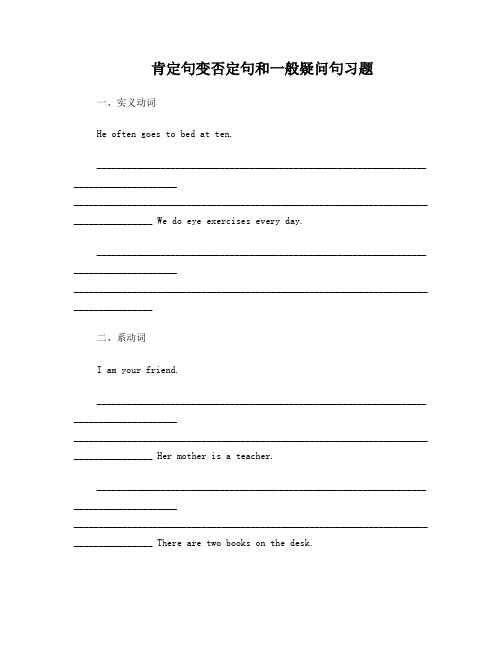
肯定句变否定句和一般疑问句习题一、实义动词He often goes to bed at ten.___________________________________________________________________ _____________________________________________________________________________________________ ________________ We do eye exercises every day.___________________________________________________________________ _____________________________________________________________________________________________ ________________二、系动词I am your friend.___________________________________________________________________ _____________________________________________________________________________________________ ________________ Her mother is a teacher.___________________________________________________________________ _____________________________________________________________________________________________ ________________ There are two books on the desk.___________________________________________________________________ _____________________________________________________________________________________________ ________________ 三、进行时The girl is standing at the station.___________________________________________________________________ _____________________________________________________________________________________________ ________________ The students are playing basketball on the playground.___________________________________________________________________ _____________________________________________________________________________________________ ________________ I am looking for a job recently.___________________________________________________________________ _____________________________________________________________________________________________ ________________ 六、情态动词You can use this dictionary.___________________________________________________________________ _____________________________________________________________________________________________ ________________ You need go tomorrow.___________________________________________________________________ _____________________________________________________________________________________________ ________________将下列陈述句变为否定句和一般疑问句。
初中英语 人教版七年级上册Unit5 肯定句改为否定句和一般疑问句课件
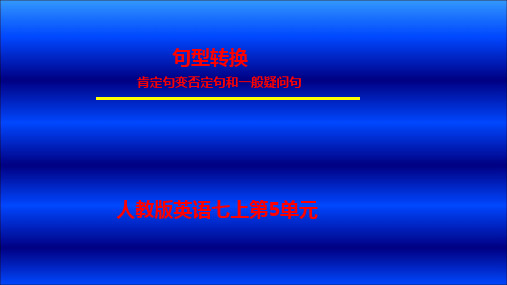
保镖法
eg: He likes bananas.(改为否定句)
He d_o_e_s_n_’__t_ __li_k_e_____ bananas?
第三人称单数胆子小, 出门需要带保镖
保镖开路,原形毕露
谓语动词是实义动词-------肯定句变一般疑问句
方法
主语第三人称单数 主语非第三人称单数
在句首加Does 在句首加Do
保镖开路,原形毕露
练一练
1 .My mother comes from Jiangsu.(改为否定句) My mother __d__o_e_s__n_’_ t co__m__e__ from Jiangsu.
2 They like swimming.(改为否定句) They ___d_o__n_’__t_ __li_k_e_____ swimming.
句型转换
肯定句变否定句和一般疑问句
人教版英语七上第5单元
目
根据谓语动词把句子分类 谓语动词是be动词怎么变否定句和一般疑问句 谓语动词是实义动词的怎么变否定句和一般疑问句的心脏
1. She is a student. 2. They are from China.
谓语动词是be动词
√ I'm not a boy. × I amn’t a boy.
e.g He is from China.(改为否定句) He is not from China.
He isn't from China.
谓语动词是be 动词-------肯定句变一般疑问句
方法
一提 二改
把be提前 第一人称改第二人称
保镖开路, 原形毕露
保镖开路,原形毕露
变否定句和一般疑问句方法
否定句及一般疑问句
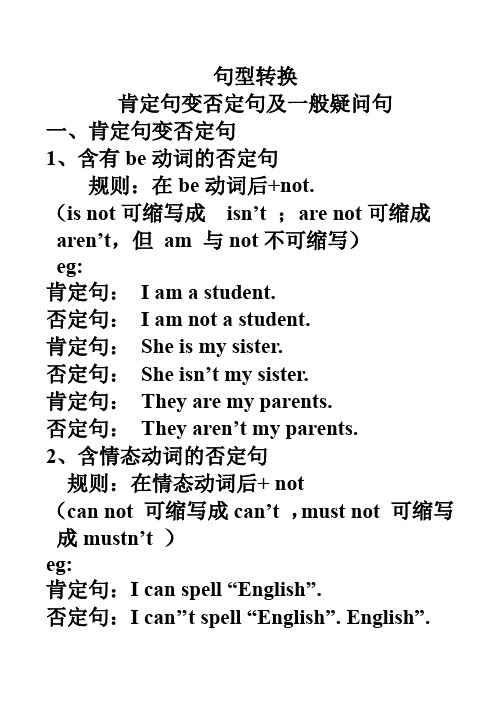
句型转换肯定句变否定句及一般疑问句一、肯定句变否定句1、含有be动词的否定句规则:在be动词后+not.(is not可缩写成isn’t ;are not可缩成aren’t,但am 与not不可缩写)eg:肯定句:I am a student.否定句:I am not a student.肯定句:She is my sister.否定句:She isn’t my sister.肯定句:They are my parents.否定句:They aren’t my parents.2、含情态动词的否定句规则:在情态动词后+ not(can not 可缩写成can’t ,must not 可缩写成mustn’t )eg:肯定句:I can spell “English”.否定句:I can’’t spell “English”.English”.肯定句:I must find it.否定句:I mustn’t find it.3、含有实义动词的句子的否定句构成(1)第三人称单数做主语。
(he、she、it或表示单个人或物的第三人称名词)规则:要在行为动词前加上助动词doesn’t,然后将动词恢复原形。
eg :肯定句:He has a soccer ball.否定句:He doesn’t have a soccer ball.(2)其它人称做主语规则:在行为动词前加don’t ,句子中的行为动词用原形。
eg:肯定句:They like bananas.否定句:They don’t like bananas.注:(1)在变否定句时,如遇some应变any Here are some books.Here aren’t any books.二、肯定句变一般疑问句1、含有be动词的句子变一般疑问句规则:把be动词提至句首,第一人称变第二人称,句末句号变问号。
(I/we变成youMy/our变成your)肯定句:I am a student.一般疑问句:Are you a student?肯定句:She is my sister.一般疑问句:Is she your sister?肯定句:They are my parents.一般疑问句:Are they your parents?2、含有情态动词的句子变一般疑问句规则:把情态动词提至句首,第一人称变第二人称,句末句号变问号。
英语四个基本时态的 肯定句变否定句

_M_r_s_.__L_i_a_n_d__K_i_t_t_y__a_r_e__n_o__t_i_n__a_b__ig__s_h_o_p__. ________ .
8. He is crying(哭) under the tree.
____H__e_i_s_n__o_t__c_r_y_i_n_g_(__哭__)___u_n_d_e_r__t_h_e__t_r_e_e__. _____ .
9. His birthday is on the twentieth of November.
The old man doesn’t do morning exercises(早操) every morning.
23. We are from China.
_________W___e__a_r__e_n__’t__f__r_o_m___C__h_i_n_a__.________ .
24. He goes to the library(图书馆) on Sundays.
_____H_e__d_o_e_s_n_’_t__g_o_t_o__th__e_l_ib_r_a_r_y__o_n_S_u_n_d_a_y_s_.____ .
25. They have a class meeting every week.
_T_h__e_y_d__o_n_’t__h_a_v_e__a__c_l_a_s_s_m__e_e_t_i_n_g__e_v_e_r_y__w__e_e_k_. .
小学英语肯定句改为否定句(知识点+练习题)
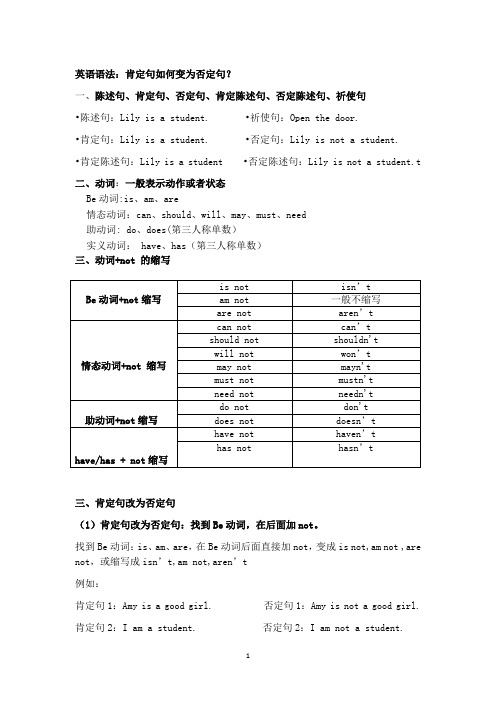
英语语法:肯定句如何变为否定句?一、陈述句、肯定句、否定句、肯定陈述句、否定陈述句、祈使句•陈述句:Lily is a student. •祈使句:Open the door.•肯定句:Lily is a student. •否定句:Lily is not a student. •肯定陈述句:Lily is a student •否定陈述句:Lily is not a student.t二、动词:一般表示动作或者状态Be动词:is、am、are情态动词:can、should、will、may、must、need助动词: do、does(第三人称单数)实义动词: have、has(第三人称单数)三、动词+not 的缩写三、肯定句改为否定句(1)肯定句改为否定句:找到Be动词,在后面加not。
找到Be动词:is、am、are,在Be动词后面直接加not,变成is not,am not ,are not,或缩写成isn’t,am not,aren’t例如:肯定句1:Amy is a good girl. 否定句1:Amy is not a good girl. 肯定句2:I am a student. 否定句2:I am not a student.肯定句3:These flowers are very beautiful.否定句3:These flowers are not very beautiful.(2)肯定句改为否定句:找到情态动词,在后面加not。
找到情态动词:can、should、will、may、must、need,在情态动词后面直接加not ,变成 can not, should not, will not,may not,must not,need not 或缩写成can’t ,shouldn't,won’t ,mayn't,mustn't,needn’t例如:肯定句1:I can speak English. 否定句1:I can not speak English.肯定句2:You should go now. 否定句2:You should not go now.肯定句3:I must do my homework. 否定句3:I must not do my homework.(3)肯定句改为否定句:在动词前面加 don't 或doesn't。
怎样把肯定句改成否定句及怎样把否定句改成肯定句

否定句:我们不要做一个懒惰的孩子。 注:要→不要 勤劳→懒惰
(二)否定句改为肯定句
例:小明不是一个调皮的孩子。(否定句改 为肯定句)
肯定句:小明是一个乖巧的孩子。
注:调皮→乖巧
练一练
1、小红是一个好孩子。 改成否定句:
2、小丁不喜欢晚睡。 改成肯定句:
肯定句和否定句怎样互改
乐安谷岗中心小学:赖祥梅
• 肯定句与否定句的互改的要点:
• 1、肯定句改否定句:加上否定词,并把关键词 改为与其意思相反的词语。(双重否定表肯定)
• 2、否定句改肯定句:去掉否定词,把关键词改 为与其意思相反的词语。
• 3、改后的句子不能改变句意,要和原句的句意 一致。
(一)肯定句改为否定句
1、小红是一个好孩子。 否定句:小红不是一个坏孩子。
2、小丁不喜欢晚睡。 肯定句:小丁喜欢早睡。
肯定句变否定句和一般疑问句类型_习题(整理了答案)备课讲稿
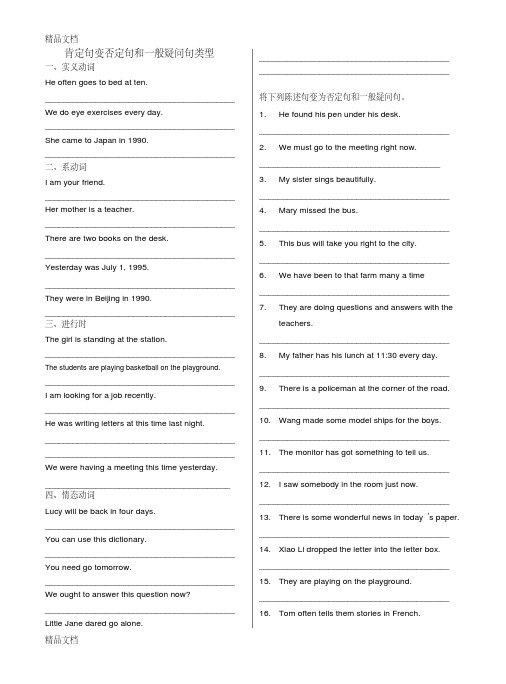
肯定句变否定句和一般疑问句类型一、实义动词He often goes to bed at ten._________________________________________ We do eye exercises every day._________________________________________ She came to Japan in 1990._________________________________________二、系动词I am your friend._________________________________________ Her mother is a teacher._________________________________________ There are two books on the desk._________________________________________ Yesterday was July 1, 1995._________________________________________ They were in Beijing in 1990._________________________________________ 三、进行时The girl is standing at the station._________________________________________ The students are playing basketball on the playground._________________________________________ I am looking for a job recently._________________________________________ He was writing letters at this time last night._________________________________________ _________________________________________ We were having a meeting this time yesterday.________________________________________ 四、情态动词Lucy will be back in four days._________________________________________ You can use this dictionary._________________________________________ You need go tomorrow._________________________________________ We ought to answer this question now?_________________________________________ Little Jane dared go alone. __________________________________________________________________________________将下列陈述句变为否定句和一般疑问句。
肯定句变否定句

肯定句变否定句一、动词后直接加not。
原句中含有be动词 (am, is, are, was, were) 。
I am a teacher. ---->I am not a teacher.我是一个老师。
---->我不是老师。
原句中含有情态动词 (can, shall, will, may, should, would, might, had better 等) 。
Li Lei can swim.---->Li Lei cannot/can't swim.李雷会游泳。
---->李雷不会游泳。
He will go to the zoo if it rains tomorrow.---->He will not/won't go to the zoo if it rains tomorrow.如果明天下雨,他将去动物园。
---->如果明天下雨,他就不去动物园了。
原句中含有助动词(have, has, had)。
We have learned 3,000 words. ---->We have not/haven't learned 3,000 words.我们已经学会了3000个单词。
---->我们还没有学会3000个单词。
We have heard from him since he left. ---->We have not heard from him since he left.他走后我们收到他的来信。
---->他走后杳无音讯。
二、原句中没有be动词,助动词或情态动词时,要在行为动词前加助动词 (do, does, did) 与否定副词 not 的缩写形式。
句中第一个动词是原形时,在其前加上don’t。
I get up at six o'clock every day.---->I don't get up at six o'clock every day.我每天六点起床。
陈述句变一般疑问句_肯定句变否定句(课堂PPT)
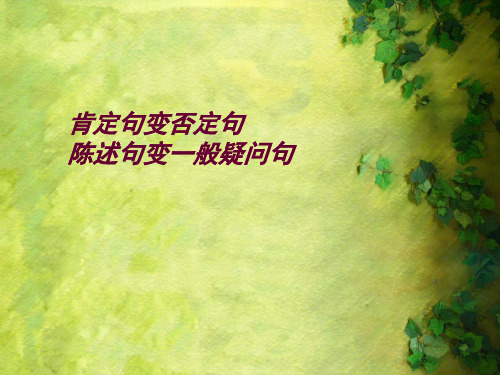
14
注意: ⑴ 据点变问号。 ⑵ 句中的第一人称变成相应的第二人称。 ⑶ some,many 变 any ⑷ 动词三单还原问题。
12
练习题:
1.You have a friend. Do you have a friend?
2. He goes to school by bus. Does he go to school by bus?
3. She likes apples.
Does she like apples?
4. They live in the country. Do they live in the country?
① 主语(复数(I))+动词原形+其他 → 主语(复数(I))+don’t+动词原形+其他
② 主语(单数)+动词单三形式+其他 → 主语(单数)+doesn’t+动词原形+其他 例如: I put a book on my head.我把书放到头上。
→ I don’t put a book on my head. 我没把书放到头 上。
在句首加助动词帮助其变成一般疑问句。主语是
一二人称及复数人称时加Do;主语是第三人称单数
形式加Does。加了Does后句子中原本的动词三单形式
要还,即
① 主语(复数(I))+动词原形+其他 → Do+主语(复数)+动词原形+其他
② 主语(单数)+动词单三形式+其他 → Does+主语(单数)+动词原形+其他
肯定句与否定句和双重否定句的转换修正过ppt课件

否定句:每个人都说她不丑陋。
8
肯定句改一般否定句 肯定句改为否定句的方法: 两个步骤:
1、找反义词。(一般情况下找谓语动词,有时
出现宾语就找宾语。)
例:她很漂亮。
小红是个女生。
丑陋
男生
2、加否定词。(一般情况下加在谓语动词前,如
果出现“很、非常、常常、都”
等表示程度的副词时把它去掉。)
例:她很漂亮。
她不丑陋。
小红是个女生。
小红不是个男生
9
把下面的句子改为否定句。
1、街道上的人真多。 街道上的人真不少。
2、张明对学习很认真。 张明对学习不马虎。
3、今天天气好。 今天天气不坏。
4、珍贵的花草容易死。 珍贵的花草不容易活。
5、大家都赞成他的意见。 大家都不反对他的意见。
10
把下面的句子改为否定句
20
将双重否定句改为肯定句: 1.他的话不无道理。
2.在场的观众无不为他的精彩表演所打动。
3.他无非是想多捞点退休金罢了。
4.我虽然年轻,但未必不是你的对手。
21
肯定句改双重否定句注意: 表判断: “是” → “谁也不能否认”或“不可能不” 表非常肯定: “一定” “必须” → “非……不可” “不能不” 表示不情愿、不得已: “只能” “只好” “只得” → “不得不” 表示全部: “全” “全都” “全部” → “没有……不”“无 不” 表示推测: “会” “可能” “能” “应该”→“不可能不” “不 会不”
例:我们不能不遵守《小学生日常行为规范》。6
注:肯定句和双重否定句在表达时语气强烈一些,但双
重否定句比肯定句语气重、程度深,而否定句在表达上
英语句型转换-肯定句变否定句

1.有be动词或者情态动词的肯定句变否定句转变方法:在be动词或情态动词后面直接加not例1. I am a student. → I am not a student.例2. You are sad. → You are not sad.例3. I can swim. → I can not swim.例4. You will go to the park.→ You will not go to the park.2.没有be动词也没有情态动词,有实意动词(表示动作的动词)的肯定句变否定句转变方法:借助助动词(do, does, did)来帮助否定①当句中的动词是原形时,加don't。
例1. I like English.→ I do not like English.例2. You have dinner.→ You do not have dinner.②当句中的动词是第三人称单数时,加doesn't ,再加动词原形。
例1. She likes singing.→She doesn't like singing.例2. She does her homework.→ She does not do her homework.③当句中的动词是过去式时,用didn't,加动词原形例: We had a great time during our holidays.→We did not have a great time during our holidays.3. 动词have/has的特殊说明:①当have表示“某人有什么的时候”,其否定形式为have not/has not例: She has two books.→ She has not two books.②当have作为实意动词时,其否定形式为do not have/does not have例: You have dinner.→You do not have dinner.③当have在完成时中作为助动词时,其否定形式为have not/has not例: I have seen this film.→ I have not seen this film.4. 一些特殊说明:①肯定陈述句中的some/too,在否定陈述句中应改为any/either。
2025届高考专题复习:变换句式课件

[在昨天下午],(我校)(全体)同学 [冒雨]参加<了>(植树造林)活动。
复句 (1)什么是复句 复句由两个或两个以上意义相关、结构上互不包含的分句组成。分 句是结构上类似单句而没有完整句调的语言单位。所谓结构上互不包含, 是说互不作句子成分。复句的各分句之间一般有停顿,书面上用逗号、 分号或冒号表示;复句句末有较大的停顿,书面上用句号、问号或叹号 表示。例如: 单句:我有一个朋友。 复句:我有一个朋友(分句),他在物价局上班(分句)。
行、冲向胜利的冰雪运动员的矫健身姿;下半部分相对 柔美圆润,既有赛场、跳台、滑道的轮廓,又似重峦叠 嶂、绵延起伏。
18.文中画波浪线处是个长句,请改成几个较短的语句。 可以改变语序、少量增删词语,但不得改变原意。
请将文中画波浪线的部分改成一个长单句。可以改变语序、少量增 删词语,但不得改变原意。
长短句的表达效果
境,第三步进行潜艇发射。
长句变短句(把多的修饰语拿出来)
1.提取主干(可保留最近的定语或状语)。
2.切分修饰成分,转换成主谓句子。(有的表时间、 地点等的状语可以直接提出来)
3.根据句子与句子间的逻辑关系调整语序。
2023四省联考(教育考试院组织) 会徽的上半部分用刚劲曲折的线条勾画出了向前滑
(1)只有杨新,才对代销店与施工队的关系感兴趣。 (2)无论文臣武将,都不得接近。 (3)只有在革除愚昧和丑陋的杂草之后,科学之树才 会结出丰硕的果实。
关联词语并不是复句专用,关联词可用于 单句表示强调。
请判断下列句子的逻辑关系: 1、如果有这种态度,那就既不是“头重脚轻根底浅”, 也不是“嘴尖皮厚腹中空”了。
小学英语语法专项之肯定句变否定句

——肯“be动词”型,直接在be动词后加not,其它照抄不 变。
be动词包括:am ,is ,are ,was ,were .
I am a student. → I am not a student.
He is a boy. → He is not/isn't a boy.
7. We did morning exercises yesterday. We didn’ t do morning exercises yesterday.
8.My sister likes apples and pears.
My sister doesn’t like apples or pears.
2.The girl can sing and dance. The girl can't sing or dance.
2.I want to have an apple ,too . I don’t want to have an apple ,either .
肯定句变否定句
相关练习:
1.Mike would like some chicken.→ Mike w_o_u_l_d_n_'t like __a_n_y__ chicken.
肯定句变否定句的方法
注意缩写: is not = isn't, are not = aren't , was not = wasn't, were not = weren't, am not没有缩写, 但是I am = I'm can not = can't, would not = wouldn't
肯定句变否定句的方法
小学英语肯定变 否定句精品PPT课件

热情周到的女主人迎接我的到来,放下随身物品后,我在小镇上随意寻觅了些小食,就来到了后院安静坐下。
头顶上是浩瀚的星空 眼前是闪烁的灯火
心中却是平和幽静的情感
远离了呼啸而过的地铁呼啸声;远离了川流不息的车流声; 等到了一个此时此刻,用我的五官感受到了一个真正美好寂静的夜晚,属于自己的夜晚。
class. • 7.There is a bird on my head.
can 的用法
• can 属于情态动词,一般表示能力, can 没有人称变化,不能单独使用, 必须后跟动词原形。
• e.g.
• You/He/I can hear the music.
I/ She/ You/ He A can dance.
请问,你怎么选择?真实情况是,好多人嘴上会说选A,但最终大都会选B。因为人们都认为自己是聪明人,当然选B,只有傻子才会选A。
谁愿意等那么长的时间?世界变化如此之快,到头来不知道会变成什么样子,这是大多数人内心的真实想法。似乎快速获取、及时行乐是人们的天性,人们的很多心理状态是由几万年基因的进化决定的。
在大城市生活的白领一族们,工作日中总是被大量的的工作任务、人际关系所裹挟,常常因为七七八八的事情压得我们透不过来气。 实际上,不管是工作还是生活,帮助我们取得成功的并非是意志,而是行动。 以至于很多人会在失落时忘却,时常违背了自己少年时期的志向。 总是自认为通情练达,自认为精明。 从前的我们多单纯,多纯粹。 而现在,丢弃了单纯与纯粹的我们,也总算是看透了,想穿了。 但也正因为如此,逐渐就变成了少年时间的自己最憎恨的那种人。
迪士尼乐园,与我们成年人而言,它是一个守护了我们童年的港湾。 在这里的所有伙伴,不论男女老少,都能卸下自己的伪装和枷锁,尽情的享受一个美好的虚幻童话世界。
- 1、下载文档前请自行甄别文档内容的完整性,平台不提供额外的编辑、内容补充、找答案等附加服务。
- 2、"仅部分预览"的文档,不可在线预览部分如存在完整性等问题,可反馈申请退款(可完整预览的文档不适用该条件!)。
- 3、如文档侵犯您的权益,请联系客服反馈,我们会尽快为您处理(人工客服工作时间:9:00-18:30)。
肯定祈使句变否定祈使句,也是 在动词前加直接don't. 3. Have some bread, Tom. Don't have any bread ,Tom. 4. Please open your books.
Please don't open your books.
Hale Waihona Puke ②当句中的动词是第三人称单数时, 在动词前加doesn’t ,动词还原原形。 She likes singing. → She doesn’t like singing. She does her homework. → She doesn’t do her homework.
肯定句变否定句
1.I am a student. → I am not a student. 2.You are sad. → You are not sad. 3. She is a good girl. → She is not a good girl. 4.Yesterday was Monday. → Yesterday was not Monday. 5.They were busy yesterday. → They were not busy yesterday.
1.如果句中有be动词
( is, am , are, was,
were),就在be动词后 面直接加not。
be 动词和not的缩写形式: is not = isn't are not = aren't was not = wasn't were not = weren't 注意:am not 不能缩写。
肯定句变否定句 练一练
1. I am your friend. _____________________________
2. My mother is a worker. _____________________________
3. There are some books on the bookshelf. _____________________
2. You can use the dictionary. You can't use the dictionary.
3. Peter need go home now. Peter needn't go home now .
4. You should say “Sorry”. You shouldn't say “Sorry”.
词后面直接加not。
can not = can't must not = mustn't should not = shouldn't need not = needn't will not = won't
1. Lucy will be back in a week. Lucy won't be back in a week.
4. You should open your book. You should not open your book. 5. He must finish his homework. He must not finish his homework.
2.如果句中有 (can ,may,must,should , need, will等),就在这些单
1. He is a boy. He is not a boy. 2. I am your friend. I am not your friend. 3. My sister is a beatiful girl. My sister is not a beatiful girl.
5.There are some books on the bookshelf. There are not any books on the bookshelf. 6. I was at home yesterday. I was not at home yesterday. 7. They were in Beijing ten years ago. They were not in Beijing ten years ago.
7.She can sing a song and draw a picture. _____________________________ 8. Peter need go home tomorrow. _____________________________ 10. We come from China. _ _____________________________ 11.He likes the violin. _____________________________
注意:句中有 some,一般要改为
any.
1.I can swim. → I can not swim. 2.You will go to the park. → You will not go to the park. 3. Peter need go home now. Peter need not go home now
③当句中的动词是过去式时,在动 词前加didn’t,动词还原原形。 We had a great time last year.→ We didn't have a great time last year.
I went to school yesterday. → I didn't go to school yesterday.
5. He must stay at home . He mustn't stay at home .
3.如果句中没有be动词,也 没有情态动词,就
要借助(don’t, doesn’t, didn’t)来帮忙。
①当句中的动词是原形 时,在动词前直接加 don’t。 I like English. → I don't like English. You have dinner. → You don't have dinner.
4. I was at home yesterday. _____________________________
5. They were in Beijing ten years ago. _________________________
6.Lucy will be back in a week. ______________________
